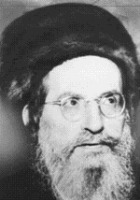Yehudah HaLevi
Yehudah HaLevi Poems
'Do you see over my shoulders falling,
Snake-like ringlets waving free?
Have no fear, for they are twisted
To allure you unto me.'
...
Fair is my dove, my loved one,
None can with her compare:
Yea, comely as Jerusalem,
Like unto Tirzah fair.
...
My sweetheart's dainty lips are red,
With ruby's crimson overspread;
Her teeth are like a string of pearls;
Down her neck her clustering curls
...
One day I observed a grey hair in my head;
I plucked it right out, when it thus to me said:
'You may smile, if you wish, at your treatment of me,
But a score of my friends soon will make a mockery of you.'
...
Lord, Your humble servants hear,
Suppliant now before You,
Our Father, from Your children's plea
Turn not, we implore You!
...
O My Lord, Your dwelling places are lovely
Your Presence is manifest, not in mystery.
My dream brought me to the Temple of God
And I praised its delightful servants,
...
Awake, my fair, my love, awake,
So that I may gaze upon you!
And if one is eager to kiss your lips,
In your dreams this do you see,
...
Forget not the day of the Sabbath,
Its mention is like a pleasant offering.
During it the dove found resting place,
And there the weary may relax.
...
He comes, O bliss!
Fly swiftly, you winds,
You odorous breezes,
And tell him how long
...
greet my love with wine and gladsome lay;
Welcome, thrice welcome, joyous Seventh Day!
Six slaves the weekdays are; I share
...
Into my eyes he lovingly looked,
My arms about his neck were twined,
And in the mirror of my eyes,
What but his image did he find?
...
Cups without wine are low things
Like a pot thrown to the ground,
But brimming with the juice, they shine
Like body and soul.
...
My heart is in the east, and I in the uttermost west—
How can I find savour in food? How shall it be sweet to me?
How shall I render my vows and my bonds, while yet
Zion lieth beneath the fetter of Edom, and I in Arab chains?
...
God, whom shall I compare to Thee,
When Thou to none canst likened be?
Under what image shall I dare
To picture Thee, when everywhere
...
O Lord, my life was known to Thee
Ere Thou had’st caused me yet to be,
Thy spirit ever dwells in me.
...
Do these tears know who made them fall?
Do these hearts know who made them recoil?
...
When Fortune's shield protects you, then beware --
Tomorrow, for your foot she sets a snare.
Her gift, an eaglet's pinion -- now your flight,
Anon, the lethal arrow -- to upbear!
...
Ever since You were the home of love for me, my love has lived where You have lived. Because of You, I have delighted in the wrath of my enemies; let them be, let them torment the one whom You tormented
...
Long in the lap of childhood didst thou sleep,
Think how thy youth like chaff did disappear;
Shall life’s sweet Spring forever last? Look up,
Old age approaches ominously near.
...
The night when the fair maiden revealed the likeness of her form to me,
The warmth of her cheeks, the veil of her hair,
Golden like a topaz, covering
...
Yehudah HaLevi Biography
Yehudah ha-Levi is one of the best-known Spanish Jewish poets. Born in Toledo when it was still under Islamic rule, he became a prolific writer of both Arabic and Hebrew poetry. His writing touches on themes such as love, friendship, religious devotion, hope, wisdom, and sorrow. Ha-Levi's most famous work is The Kuzari, comprised of 5 essays written between 1120 and 1140. The Kuzari tells how the king of the Khazars decided to adopt Judaism after consulting with apologists for the Christian, Islamic, and Judaic religions. According to Rabbi Eliyahu (the "Gaon") of Vilna, The Kuzari is "holy and pure, and the fundamentals of Israel's faith and the Torah are contained within." It has been translated into Hebrew, Ladino, English, French, German, and several other languages.)
The Best Poem Of Yehudah HaLevi
A Love Song
'Do you see over my shoulders falling,
Snake-like ringlets waving free?
Have no fear, for they are twisted
To allure you unto me.'
Thus she spoke, the gentle dove,
Listen to your plighted love:
'Oh, how long I wait, till my sweetheart comes back,' she said,
'Laying his caressing hand underneath my burning head.'
Yehudah HaLevi Comments
The philosopher seeks.Truth through reason. But beyond reason, Truth is found in apprehension, in Poetry!
Profound concept of non-duality reality for Love and Joy and Pain are part of the same root.
Tis a fearful thing to love To love what death can touch A fearful thing To love, to hope, to dream, ...to be To be, and know, ..to lose A thing for fools, ...this And a holy thing A holy thing, ... to love For your life is lived in me Your laugh once lifted me Your word was gift, ...to me To remember this, brings painful joy Tis a human thing, -love A holy thing To love what death has touched And
what is the name of this poem and is it the whole poem or just a part? i noticed this ended in And.

Please explain to me why a poem concerning bin Laden's death and an anorexic cat lady are attributed to a man who lived in the 10th century. Yes... and why the photo?